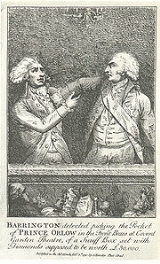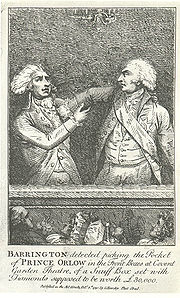
George Barrington
Encyclopedia

Ireland
Ireland is an island to the northwest of continental Europe. It is the third-largest island in Europe and the twentieth-largest island on Earth...
-born pickpocket, popular London socialite
Socialite
A socialite is a person who participates in social activities and spends a significant amount of time entertaining and being entertained at fashionable upper-class events....
, Australian pioneer
Exploration
Exploration is the act of searching or traveling around a terrain for the purpose of discovery of resources or information. Exploration occurs in all non-sessile animal species, including humans...
(following his transportation
Penal transportation
Transportation or penal transportation is the deporting of convicted criminals to a penal colony. Examples include transportation by France to Devil's Island and by the UK to its colonies in the Americas, from the 1610s through the American Revolution in the 1770s, and then to Australia between...
to Botany Bay
Botany Bay
Botany Bay is a bay in Sydney, New South Wales, a few kilometres south of the Sydney central business district. The Cooks River and the Georges River are the two major tributaries that flow into the bay...
), and author. His escapades, arrests, and trials, were widely chronicled in the London press of his day. For over a century following his death, and still perhaps today, he was most celebrated for the line "We left our country for our country's good." The attribution of the line to Barrington is considered apocryphal since the 1911 discovery by Sydney book collector Alfred Lee of the 1802 book in which the line first appeared.
Personal
Barrington was born at MaynoothMaynooth
Maynooth is a town in north County Kildare, Ireland. It is home to a branch of the National University of Ireland, a Papal University and Ireland's main Roman Catholic seminary, St. Patrick's College...
, the son of a working silversmith
Silversmith
A silversmith is a craftsperson who makes objects from silver or gold. The terms 'silversmith' and 'goldsmith' are not synonyms as the techniques, training, history, and guilds are or were largely the same but the end product varies greatly as does the scale of objects created.Silversmithing is the...
named Waldron, or Captain Barrington, English troop commander.
At some point in the 1785–1787 period he married and the couple had a child, but the names of the wife and child, and their eventual fates, are not known.
While enjoying the beginnings of his prosperity in Australia, Barrington romanced and cohabited
Cohabitation
Cohabitation usually refers to an arrangement whereby two people decide to live together on a long-term or permanent basis in an emotionally and/or sexually intimate relationship. The term is most frequently applied to couples who are not married...
with a native woman, Yeariana, who soon left him to return to her family. Barrington said that Yeariana possessed "a form that might serve as a perfect model for the most scrupulous statuary."
Barrington died at Parramatta
Parramatta, New South Wales
Parramatta is a suburb of Sydney, in the state of New South Wales, Australia. It is located in Greater Western Sydney west of the Sydney central business district on the banks of the Parramatta River. Parramatta is the administrative seat of the Local Government Area of the City of Parramatta...
in 1804.
Pickpocketing
In 1771 he robbed his schoolmasterSchoolmaster
A schoolmaster, or simply master, once referred to a male school teacher. This usage survives in British public schools, but is generally obsolete elsewhere.The teacher in charge of a school is the headmaster...
at Dublin and ran away from school, becoming a member of a touring theatrical company under the assumed name of Barrington. At the Limerick races he joined the manager of the company in picking pockets. The manager was detected and sentenced to transportation
Penal transportation
Transportation or penal transportation is the deporting of convicted criminals to a penal colony. Examples include transportation by France to Devil's Island and by the UK to its colonies in the Americas, from the 1610s through the American Revolution in the 1770s, and then to Australia between...
, and Barrington fled to London
London
London is the capital city of :England and the :United Kingdom, the largest metropolitan area in the United Kingdom, and the largest urban zone in the European Union by most measures. Located on the River Thames, London has been a major settlement for two millennia, its history going back to its...
, where he assumed clerical dress and continued his pickpocketing
Pickpocketing
Pickpocketing is a form of larceny that involves the stealing of money or other valuables from the person of a victim without their noticing the theft at the time. It requires considerable dexterity and a knack for misdirection...
. At Covent Garden
Covent Garden
Covent Garden is a district in London on the eastern fringes of the West End, between St. Martin's Lane and Drury Lane. It is associated with the former fruit and vegetable market in the central square, now a popular shopping and tourist site, and the Royal Opera House, which is also known as...
theatre he robbed the Russian Count Orlov of a snuff
Snuff
Snuff is a product made from ground or pulverised tobacco leaves. It is an example of smokeless tobacco. It originated in the Americas and was in common use in Europe by the 17th century...
-box, said to be worth £30,000. He was detected and arrested, but as Count Orlov declined to prosecute, was discharged, though subsequently he was sentenced to three years hard labour for pocket-picking at Drury Lane
Drury Lane
Drury Lane is a street on the eastern boundary of the Covent Garden area of London, running between Aldwych and High Holborn. The northern part is in the borough of Camden and the southern part in the City of Westminster....
theatre.
On his release he was again caught at his old practices and sentenced to five years hard labour, but influence secured his release on the condition that he left England
England
England is a country that is part of the United Kingdom. It shares land borders with Scotland to the north and Wales to the west; the Irish Sea is to the north west, the Celtic Sea to the south west, with the North Sea to the east and the English Channel to the south separating it from continental...
. He accordingly went for a short time to Dublin, and then returned to London, where he was once more detected pocket-picking, and, in 1790, sentenced to seven years transportation.
At Botany Bay
One account states that on the voyage out to Botany BayBotany Bay
Botany Bay is a bay in Sydney, New South Wales, a few kilometres south of the Sydney central business district. The Cooks River and the Georges River are the two major tributaries that flow into the bay...
a conspiracy was hatched by the convicts on board to seize the ship. Barrington disclosed the plot to the captain, and the latter, on reaching New South Wales
New South Wales
New South Wales is a state of :Australia, located in the east of the country. It is bordered by Queensland, Victoria and South Australia to the north, south and west respectively. To the east, the state is bordered by the Tasman Sea, which forms part of the Pacific Ocean. New South Wales...
, reported him favourably to the authorities, with the result that in 1792 Barrington obtained a warrant of emancipation
Emancipist
An emancipist was any of the convicts sentenced and transported under the convict system to Australia, who had been given conditional or absolute pardons...
(the first issued), becoming subsequently superintendent of convicts and later high constable
Constable
A constable is a person holding a particular office, most commonly in law enforcement. The office of constable can vary significantly in different jurisdictions.-Etymology:...
of Parramatta
Parramatta, New South Wales
Parramatta is a suburb of Sydney, in the state of New South Wales, Australia. It is located in Greater Western Sydney west of the Sydney central business district on the banks of the Parramatta River. Parramatta is the administrative seat of the Local Government Area of the City of Parramatta...
.
Literary works
According to his biographer Richard S. Lambert, the first volume of Barrington's memoirs about Australia, "A Voyage to Botany Bay," is the work of Barrington's that is least changed, or wholly invented, by editors and publishers. Lambert goes on to say that the later works published under his name in 1802 and 1810, as well as other works published after his death, are inventions by publishers, incorporating the works of other authors in order to create sales.It is in fact, in the 1802 volume that the poem with the famous line ascribed to Barrington appears, a 48-line "Prologue" said to have been written for the 1796 opening of a Sydney theatre. In 1905, the Sydney book collector Alfred Lee discovered the 1802 English book "Original Poems and Translations...chiefly by Susanna Watts," which collected poems by Watts and others. The "Prologue" in the book included a pencil notation attributing it to a "Hy. Carter, Esq." The Henry Carter version is in fact, somewhat differently worded than the version ascribed to Barrington, and according to Lambert clearly referred to the 1800 opening of another Sydney theatre. It seemed obvious to Lambert, and perhaps Lee, that Barrington's publishers in 1802 had taken the poem and subtly changed it to make it seem to be about the 1796 theatre opening in which Barrington took part.
Latter-day renown
Whatever doubts may exist about the authorship of the "Prologue," its most famous line has become an iconic part of Australian culture. (For example, it is quoted in the film Breaker MorantBreaker Morant (film)
Breaker Morant is a 1980 Australian film about the court martial of Breaker Morant, directed by Bruce Beresford and starring British actor Edward Woodward as Harry "Breaker" Morant...
and provides the title of the play Our Country's Good
Our Country's Good
Our Country's Good is a 1988 play written by British playwright, Timberlake Wertenbaker, adapted from the Thomas Keneally novel The Playmaker. The story concerns a group of Royal Marines and convicts in a penal colony in New South Wales, in the 1780s, who put on a production of The Recruiting...
). It begins:
From distant climes, o'er wide-spread seas, we come,
Though not with much éclat or beat of drum,
True patriots all: for, be it understood:
We left our country for our country's good.
—George Barrington, A History of New South Wales
Works
- A Voyage to New South Wales. In two volumes, the first of which is "A Voyage to Botany Bay." London, 1795 and 1801.
- The History of New South Wales. London, 1802 and 1810.
External links
- Works by George Barrington at Project Gutenberg Australia.
- Barrington's Australian Dictionary of Biography entry and library holdings at the National Library of Australia.
- Books.google entries on Alfred Lee's discovery regarding what the Australian Encyclopaedia entry refers to as the "Barrington Prologue."
- Australian Dictionary of Biography entry on Alfred Lee, discoverer of the original source of the "Barrington Prologue."

